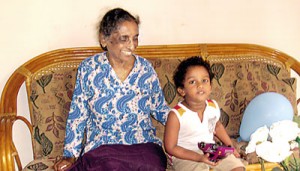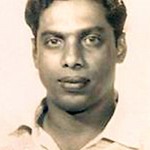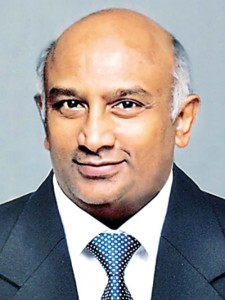Appreciations
View(s):Sheela Perera
A heart made of gold
I cried when you passed away
I still cry today
Although I loved you dearly
I couldn’t make you stay,
A golden heart stopped beating
Hard working hands at rest
Archie, missing you always,
You never said I’m leaving
You never said goodbye
You were gone before I knew it
And God only knows why?
A million times I needed you
A million times I cried
If I alone could have saved you
You never would have died
In life I loved you dearly
In death I loved you still
In my heart I hold a place
That only you can fill.
Grandma, her ears that truly listen,
Her hands that always hold
Her love that never ends
Her heart that’s made of gold.
-Kulani Pathirana
SHEILA SALDIN
Her memory shines bright in our hearts
When Sheila left this world a few days ago, she left us bereft. The wonderful friendship we shared for over sixty years is now only a memory. It was in the halcyon days of the [one and only] University in the 1950s that my friend BDK and I, saw her tripping along to ‘College’ from “Merdeka” the home of her uncle Dr. Drahaman. It didn’t take BDK long to cement a romance that lasted six decades or so. Little was I aware that this petite miss was a trailblazer in the Malay community as the very first Malay girl to enter the University and graduate – which she did from Peradeniya. Her undergrad life was one of friendship and fun – with BDK’s brother and mine also in this happy band.
She married BDK [of course] soon after graduation and went onto have a successful career as a teacher. BDK, in the meanwhile, who had been moving around in various unsatisfying jobs, made the bold decision to embark on a career in Accountancy, something that his degree had given him a taste for. But study had to be full time and Sheila boldly stepped into the role of sole breadwinner. She handled this with aplomb while being an accomplished home-maker and mother of an infant son. Her sacrifice bore fruit when BDK qualified and, in time, rose to great heights in his chosen profession. They built a beautiful house in Borupana where Sheila had a flourishing garden thanks, Sheila claimed, to her speaking to her plants!
Indrani and I married not long after and the friendship of both our families became writ in stone. Both our brothers Tuan and Somasiri, and their families seamlessly slipped into this ‘extended family’.
My work led us to live in various towns away from the metropolis – but we always tried to make it to Sheila’s home for their annual Ramazan bash. Perhaps, our best times were when I was Government Agent in Trincomalee and the Saldin family, with their sons Rimoe and Quresh, came to holiday with us in the sprawling Residency. It was great fun, with sailing by yacht to Pigeon Island and evening sing-a-longs round a bonfire in the garden. Sheila was in her mettle, a jolly singer and amusing raconteur.
We later came to live in Mount Lavinia, not far from the Saldins in Ratmalana and we met together much more often and get-togethers were pretty regular – at the drop of a hat. But time marched on to our inevitable retirement, children leaving the nest and the aches and pains of ageing. The Saldins moved to Dehiwala and we to Thimbirigasyaya. We could not meet as often as we wished – but never missed a family function. Sheila took great pride in Pravira her first grandson and, as a student of Ludowyk, applauded his success in international student debates.
Sheila, whom we loved, is no more – but her memory shines bright in our memories. We share , though we can never equal, the sorrow of BDK, their sons, grandsons and her younger sister Ruhasni- to whom she was a mother.
- Tissa and Indrani Devendra
Charles Santiapillai
His life was a blessing to many
Professor Dr. Charles Santiapillai who took ill suddenly, underwent an operation and passed away on October 29. It was shocking news for his beloved family and friends. Dr. Charles lived an exemplary life as a devoted husband to Anoma, an affectionate father to Praveen and Shama, a loving grandfather and an understanding father-in-law. He was also a respected and erudite professor at Peradeniya University and was a loving and caring mentor to many, as well as a prolific writer.
Many were privileged to have moved with him closely and to have enjoyed his love and wisdom. His life was a blessing to many, irrespective of their religion, race or nationality. The litany of graduations and positions in life achieved by his students are especially spraiseworthy.
He hailed from Karampon, a village known as “Little Vatican” in the Jaffna diocese. His father, late Mr. S.F.Santiapillai was instrumental in my admission at St .Patrick’s. Dr. Charles was a “chip of the old block” and soon became a renowned veteran in the field of zoology many seeking his advice and guidance in animal protection and conservation, especially on elephants in Sri Lanka. He won many international awards here and abroad.
When my son, Selvan was at Peradeniya University he cared for him with much affection and guided him in his studies, encouraging him to become the President of the Tamil Musical Sangeetha Naadiya Mantram. Dr. Charles always spoke to me with words of affection and concern. He had a sensitive heart to help the needy and was a faithful friend in times of adversity and for those who were in monetary difficulties.
He married a respectable Kandyan Sinhalese Buddhist lady but kept in touch with his Tamil culture and Christian faith. His family honoured his last wishes and took his ashes to Jaffna where they were interred at the Cathedral of St Mary’s Cemetery, Jaffna in his parents’ grave.
His demise is an irreparable loss; May the Merciful Lord bless his soul and welcome him into His Kingdom and grant him Eternal Bliss.
“The wise man delights in the truth
And follows the law of the awakened.
When he sees the good he has done
For great is the harvest in this world
And greater still in the next”
- S.B.David
Valentine Basnayake
A remarkable and gifted man
Sri Lanka is much the poorer with the passing of Valentine Basanyake, a gifted man whose acquaintance I was privileged to have made so many years ago. From that acquaintance was born a friendship forged by our shared passion for classical music.
When my sister, Mary Anne was just embarking on her career as a singer and a performer in the late 1970s/early 1980s, ‘Bas’, as many called him, had already acquired a reputation as the pre-eminent accompanist. His association with many a singer or instrumentalist, including choirs, as I recall, carried with it the stamp of excellence. One could be assured the ensuing performance would reflect the high standards to which he always aspired.
In those early years, the German Cultural Institute, headed by Dr.Rolf Denker, ably assisted by the indefatigable June Boralessa, was at the forefront of Colombo’s rich musical life. The Institute frequently hosted concerts and the piano with Bas, was at the centre of these gatherings. It was also that time German Lied, with the sublime compositions of Schubert,Schumann and Richard Strauss, was popularised by such distinguished singers as Lylie Godridge, Nimal Senanayake and my own sister Mary Anne.
I vividly recall accompanying her to rehearsals at Bas’s home. It struck me even then that here was no ordinary accompanist, purely going through the motions of playing the piano and sight –reading. On the contrary, Bas instinctively demonstrated that, with the Lied, the voice and the piano are inextricably linked. He was particularly attentive to detail, to the subtlest of nuances, the rightness of the tempo, and had an uncanny sense of anticipation. These qualities were a great boon to any performer, more so for a singer.
Quite apart from his role and reputation as an accompanist, Bas was also a soloist in his own right, with particular affinity to the music of Franz Liszt. He seemed to approach this music in awe and reverence, and never appeared to be content with his superb playing of such timeless masterpieces as the Spanish Rhapsody or the Schubert/Liszt transcription of “Auf dem Wasser zu singen”. Humility before such high art was another hallmark of this remarkable man.
In thinking about my friend, Bas, my mind harks back to a celebrated observation by the legendary Herbert von Karajan, during a period of crippling illness, that on his passing, it was Nature’s duty to provide him another body because he had so much more to contribute.
While I fervently believe Bas was denied the opportunity to finish his life’s work, I am gratified by the acts of so many committed to sharing, honouring and preserving his memory. I know I shall do my own part in this endeavour, for we shall not see the likes of him again.
Bas, may angelic choirs accompany you to His eternal presence.
-Louis Roberts
H.S. DE Silva
Great Royalist ruggerite
As the eldest child of Sherman De Silva, a reputed pioneering Southern trader, H.S. established his name by representing Royal College (RC) at rugby at the age of 15 under Lionel Almeida (1956). He had the habit of wearing his collars up! H.S. would also shine in Athletics.
He kept a very close circle of school friends with his best pal Lalith Senanayake and Sarath Kodagoda unfortunately inducing the latter to play rugby. The match vs. Zahira put paid to his cricketing prowess prematurely.
Under Lionel Almeida in 1956, H.S. played 2nd Row in the team that had K.L. Gunaratna, Tyrrell Muttiah, F.B. Crozier, Patrick Poulier and Roti Sivaratnam. Royal was outplayed by David Frank’s Trinity College, Kandy (TCK) side boasting six rugby greats who played for Sri Lanka together.
Under Roti Sivaratnam in 1957, H.S. and his brother L.D. De Silva propped with Ralph Wickremaratne, E.L. Pereira, O.G. Samaratunge, S.K. Samaraweera and Maurice Anghie with RC again being “pipped at the post” by the TCK side under Ken De Joedt, sealed by Balthazar’s 60-yard dribble try.
Under Dudley Fernando in 1958, H.S. played second row to break the hoodoo after seven years. In the team were Lorenz Pereira, Maurice Anghie, O.G. Samaratunge, Tony Rankine, and the crack 3rd Row of Roti Sivaratnam, Dudley Fernando and Mutte Fernando. Lorenz’s best ever Bradby try vs. a formidable TCK team led again by Ken De Joodt saw RC triumph.
In response to my Rugby trivia to him last month as to why he did not captain RC Rugby in 1959, having played in Lionel Almeida’s 1956 year, his thoughtful response was of possibly being overlooked by his peers as Maurice Anghie was emigrating but added that if he was Captain in 1959 Ken Balendra may have captained in 1960.
Maurice Anghie was a brilliant fly-half completely dominating Nimal Maralande. H.S. as a true sportsman cum gentleman without a word played second row under Maurice Anghie in 1959 where RC again won against Denzil Kobbekadduwa’s side.
Having been capped for a record 10 Bradbys, being rugby and athletics Captain and School Prefect, it was ironic that under H.S.’s captaincy in 1960 a relative young side RC was narrowly beaten by Eric Roles’ TCK side
H.S. inspired a family of well-known brothers who represented both Royal and Trinity at both cricket and rugby and later changed the name of his father’s firm to Sherman Sons & Co Ltd with his dignified and attractive sisters as well.
Joining his Father’s firm from RC, working himself to the top as Chairman and later as Chairman of the Ceylon Chamber of Commerce, H.S. silently suffered from his old Rugby injuries and numerous illnesses.
H.S. pursued meditation without neglecting his schoolboy sweetheart Nelika with whom he would have celebrated their golden 50th wedding anniversary had not sudden death snatched him away. They have two beloved sons.
May he attain the Supreme Bliss of Nirvana.
-Mithila Gunaratna
Ravi Sangakkara
The gentle giant
Prof. Ravi Sangakkara, 64, passed away after a tragic accident on August 29 in Kandy, Sri Lanka. Ravi was known worldwide, as a renowned scientist, but above all he was a member of the Department of Crop Science, University of Peradeniya, Sri Lanka, and a long term guest at ETH Zurich. We, his colleagues from the ETH Zurich, have the privilege to remember and honour him as an esteemed member of our Swiss university, where he was a warmly welcomed and highly appreciated guest professor for tropical crops every year for three months since 1992. But neither his home nor his host university could truly claim to have had him alone throughout the years, as he and his broad expertise were in demand on all continents, for research projects, exchange visits or memberships in committees and advisory boards. His work took him to more than 50 countries.
Professor Sangakkara was an eminent student and a senior prefect of Trinity College, Kandy (1958-71), and claimed the Ryde gold medal given to the best all round student in 1971, as this remained Ravi’s attribute that we respected most. After his secondary school, Ravi entered the Faculty of Agriculture, University of Peradeniya in 1972 and graduated with Second Class Honours Upper Division. Without hesitation, he was appointed an Assistant Lecturer, first in the Department of Agricultural Engineering, later transferred to the Department of Crop Science, reviewing his remarkable understanding on crops and crop production, which matters the most. Ravi was a Commonwealth Scholar in 1979, and awarded with his doctoral degree (PhD) in Crop Ecology and Environment from Massey University, New Zealand in 1983. His devotion to serve Sri Lanka was the sole reason to come back even with ample opportunities elsewhere. After his return, he was promoted as a senior lecturer, and in quick time he was appointed as an Associate Professor in Crop Science in 1992 and appointed a full Professor in 1994, becoming the youngest Professor in the University of Peradeniya.
Ravi focused his efforts also on the development of science in his home country; he was a founder member of the National Science Foundation, Sri Lanka and chaired the Research Advisory Board on Agriculture and Food. He was of course a member of numerous scientific societies and editorial boards. He was especially proud to be – until recently – the only Asian member in the Editorial Board of The Journal of Agricultural Science (Cambridge) in its 104 year history. Despite his outstanding qualities as a scientist and as a teacher, Ravi was always a modest person who never claimed attention to himself. He could afford it, as it would be tiring to mention all the rewards he received during his school and university time, and ever afterwards, in a professional life full of honours.
His research topics in Sri Lanka ranged from crop plants for food, feed and industry, including wild and cultivated medical plants, to cropping systems, focussing on weed management. This resulted in numerous publications and conference contributions that made him nationally and internationally visible and built the basis of his scientific reputation globally.
For ETH, he was an honest broker of tropical agriculture able to transmit the fascination for the natural beauties of his home country and to find solutions to urgent problems. He was capable of taking his audience with him into a world of richness and diversity in agricultural systems and to challenge everyone by promoting them on the basics of abiotic stress, soil fertility and sustainable management. Thereby, he made students realise that there is only a thin line between a ‘Garden of Eden’ and a devastated field. Once this line is crossed, it can take forever to return. Motivated by discussions with him, more than 25 ETH students used the chance to work under his supervision and diligent guidance in Sri Lanka, at all levels of education, from trainees to PhD students. They kept contact among each other, cultural bonds that last long.
Throughout this period of our mutual exchange, he enlarged his knowledge in controlled growth studies and hypotheses (and thus literature) driven research of crop physiology. These experiences, particularly during the early years of cooperation, strongly formed his decision-making in research, always strict in applying the appropriate methodology for reaching his goals. Since about the year 2000, our cooperation started to focus on cropping systems and soil fertility. This was an important concern of Ravi, strengthened by his own impressions received in numerous field visits around the globe. Students were exchanged between our countries to combine research and education in field studies, mostly with maize and legumes, resulting in many graduate theses, publications and conference proceedings. At the time of his tragic accident, Ravi was working on several additional manuscripts for high profile publications. Clearly, we will work on their publications in his memory.
A younger generation of colleagues at ETH Zurich took over the inspiring and fruitful cooperation, knowing about the precious talent of Ravi in teaching and research as well as about the challenge to get research funded.
We will honour and remember Ravi as an outstanding researcher, as a gifted teacher and as a true ambassador who built bridges between agricultural scientists from European countries and the tropics around the world and between theory and practice. Ravi will be missed and remembered also by his many friends and colleagues for his humility, integrity, compassion, and outstanding interpersonal skills.
-Ravi`s colleagues at ETH, Stamp P, N Buchmann, E. Frossard, B. Lehmann, J. Nösberger, A. Walter and Chaminda Egodawatta (Rajarata University)


